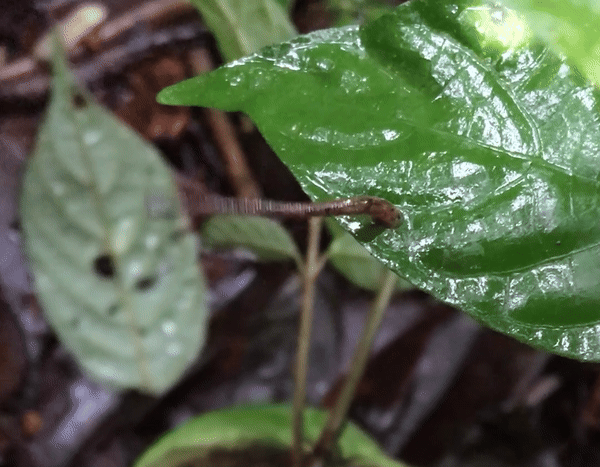Weird Animals
The World's Largest Animal Genome Belongs to an Odd, Air-Breathing Fish
Scientists sequenced the 91 billion base pairs in the South American lungfish’s genome, setting a record and revealing insights into vertebrate evolution
Rare Fossils Give Clues to How Tardigrades Survived Mass Extinctions by Hitting the Snooze Button
Scientists have only four known tardigrade fossils, which preserve insights into how the hardy critters evolved their hibernation-like superpower of cryptobiosis
Rare 1-in-100-Million 'Cotton Candy' Lobster Found off the Coast of New Hampshire
A rare genetic mutation gives the crustacean its unique hues but also makes it more vulnerable to predators
Parasites Are Everywhere. Why Do So Few Researchers Study Them?
Aging parasitologists are working hard to inspire more students to enter the field
Taco-Shaped Creature Had a 'Major Edge' in Evolution—and 30 Pairs of Spiny Legs
This shrimp-like arthropod was among the first to have a mandible, and it used a complex feeding mechanism during the Cambrian explosion, according to a new study
When It Comes to Romantic Gift-Giving, Humans Aren’t Alone. Snails, Birds and Flies All Woo Each Other With Presents
Throughout the animal kingdom, sweethearts bestow offerings with their amorous advances
Watch Blood-Sucking Leeches Leap From Leaves and Soar Through the Air
New videos may help settle scientists' long-standing debate over whether leeches can jump
Is This the First Recorded Footage of a Colossal Squid Living Freely?
The only sightings of the animals so far have come from corpses or creatures dragged up from the depths
Meet the 'Echidnapus,' an Extinct Creature That Resembles Both the Echidna and Platypus of Today
The species is among three newly identified monotremes, or egg-laying mammals, discovered from fossils in Australia that are shedding light on the odd animals' evolution
See the Rare, 2,000-Pound Hoodwinker Sunfish That Washed Ashore in Oregon
The species was only described in 2017 after "hiding in plain sight" for nearly three centuries
A Poisonous Diet Gives These Animals Their Own Toxic Defense
From monarchs to sea slugs, various creatures consume chemicals that keep predators at bay
Bizarre Sex Helped Anglerfish Diversify and Dominate the Deep Sea, Study Suggests
Some of these fish perform obligate parasitism, in which males attach to—and then fuse bodies with—the much-larger females
Inside the Wild Ways Many Creatures Make Milk
Mammals aren’t the only animals that provide nutritious secretions for their young
Dice Snakes Fake Their Own Deaths With Gory, Poop-Filled Theatrics
When attacked by a predator, the reptiles can play dead with convincing detail, employing blood and feces for the show
Move Over, Cicadas: These Living Things ‘Go Dark’ For a Long Time, Too
From frogs to orchids, many organisms go dormant or move underground for lengthy stints
Tiny and Rare, a Blind Mole That 'Swims' Through Desert Sand Is Spotted in Australia
Typically seen just five to ten times per decade, the elusive species has now been found for the second time in six months
Why Do So Many Beetle Species Exist?
Diet played a key role in the evolution of the vast beetle family tree
Florida Fish Are Mysteriously Dying After 'Spinning and Whirling,' and Scientists Can't Explain It
The abnormal behavior has raised special concerns about the endangered smalltooth sawfish, an odd-looking ray with chainsaw-like teeth, as 28 of them have died
Dive Into the Exotic World of Nudibranchs, the Spectacular Slugs of the Sea
Psychedelic hedgehogs, purple pineapples, living strawberries—these tiny creatures show off their big personalities off the Australian coast
14 Fun Facts About Parrots: They Can Sing, Use Tools and Live a Long, Long Time
And one species can even weigh as much as a house cat
Page 1 of 37
:focal(2000x1505:2001x1506)/https://tf-cmsv2-smithsonianmag-media.s3.amazonaws.com/filer_public/b8/63/b863fe13-8270-4ba6-8d7a-baff88e850ff/south_american_lungfish_lepidosiren_paradoxa_1.jpg)
:focal(1331x701:1332x702)/https://tf-cmsv2-smithsonianmag-media.s3.amazonaws.com/filer_public/84/ea/84eaccf4-aa95-4c71-83fa-e165dc095671/screenshot_2024-08-19_at_23348_pm.png)
:focal(2016x1517:2017x1518)/https://tf-cmsv2-smithsonianmag-media.s3.amazonaws.com/filer_public/ef/f9/eff9a27e-4247-4e6b-ad69-a97262c94224/cotton_candy_lobster-seacoast_science_center-july_2024_-_3.jpeg)
:focal(800x602:801x603)/https://tf-cmsv2-smithsonianmag-media.s3.amazonaws.com/filer_public/58/ed/58ed036d-8bc4-4be2-ae67-d07a0c2e33a6/img_9264_web.jpg)
:focal(350x273:351x274)/https://tf-cmsv2-smithsonianmag-media.s3.amazonaws.com/filer_public/cb/d2/cbd26d57-53f0-46b1-80ec-6ddd33adfd75/low-res_odaraia_life_reconstruction_by_danielle_dufault.jpg)
/https://tf-cmsv2-smithsonianmag-media.s3.amazonaws.com/filer/15/bf/15bf2e71-416c-4bfc-929a-a69e4d9253b7/istock-185090020.jpg)

:focal(800x602:801x603)/https://tf-cmsv2-smithsonianmag-media.s3.amazonaws.com/filer_public/97/6b/976bb36d-402d-46bb-92c9-879ec4638293/gettyimages-455504354_web.jpg)
:focal(517x379:518x380)/https://tf-cmsv2-smithsonianmag-media.s3.amazonaws.com/filer_public/5a/2c/5a2c8abd-95de-4b9f-a80a-045996094de7/age_of_monotremes__echidnapus_bottom_right_ilustration_by_peter_shouten.jpeg)
:focal(1024x770:1025x771)/https://tf-cmsv2-smithsonianmag-media.s3.amazonaws.com/filer_public/63/01/63013d56-b4df-4568-be95-5f27f6ec2300/447796630_855343633299090_6211212718569457602_n.jpg)
:focal(800x602:801x603)/https://tf-cmsv2-smithsonianmag-media.s3.amazonaws.com/filer_public/43/dc/43dc0f07-5eed-4577-9c92-63190e3c621a/toxicanimals-2024-v2.jpg)
:focal(299x236:300x237)/https://tf-cmsv2-smithsonianmag-media.s3.amazonaws.com/filer_public/59/2e/592ea0f4-c462-4982-b93f-4131ba9f6f7f/bufoceratias.jpg)
:focal(800x602:801x603)/https://tf-cmsv2-smithsonianmag-media.s3.amazonaws.com/filer_public/18/d6/18d634ea-2ae2-4226-8b62-e0338372b016/mailho-fontana-adi5379-image-9_web.jpg)
:focal(874x575:875x576)/https://tf-cmsv2-smithsonianmag-media.s3.amazonaws.com/filer_public/e9/05/e905e153-411a-4ea7-b9f1-94a18f954fac/rsbl20240058f001.jpg)
:focal(800x602:801x603)/https://tf-cmsv2-smithsonianmag-media.s3.amazonaws.com/filer_public/0a/7e/0a7ee487-2b70-4637-b83a-7887d06153bd/animalshibernate-v2.jpg)
:focal(539x329:540x330)/https://tf-cmsv2-smithsonianmag-media.s3.amazonaws.com/filer_public/ae/2b/ae2b58bf-484e-43df-9d6a-58f018bc2234/434749376_741389914792687_4648279299303661221_n.jpg)
:focal(800x602:801x603)/https://tf-cmsv2-smithsonianmag-media.s3.amazonaws.com/filer_public/3a/ce/3ace8da0-ae7a-48df-a5e2-ae05bf005fbb/gettyimages-697024166_web.jpg)
:focal(400x267:401x268)/https://tf-cmsv2-smithsonianmag-media.s3.amazonaws.com/filer_public/af/41/af413d12-40fb-47c2-b475-1cd918646a74/sawfish-necropsy.png)
:focal(1728x1053:1729x1054)/https://tf-cmsv2-smithsonianmag-media.s3.amazonaws.com/filer_public/10/e9/10e92871-2646-4dfc-87e2-20ea31a0203e/goniobranchus_sp_photo_by_michael_aw_awm9156_copy.jpg)
:focal(800x602:801x603)/https://tf-cmsv2-smithsonianmag-media.s3.amazonaws.com/filer_public/75/13/7513c5a6-05d0-4f18-917b-a5b4942c5bf9/ara_macao_-fort_worth_zoo-8_web.jpg)